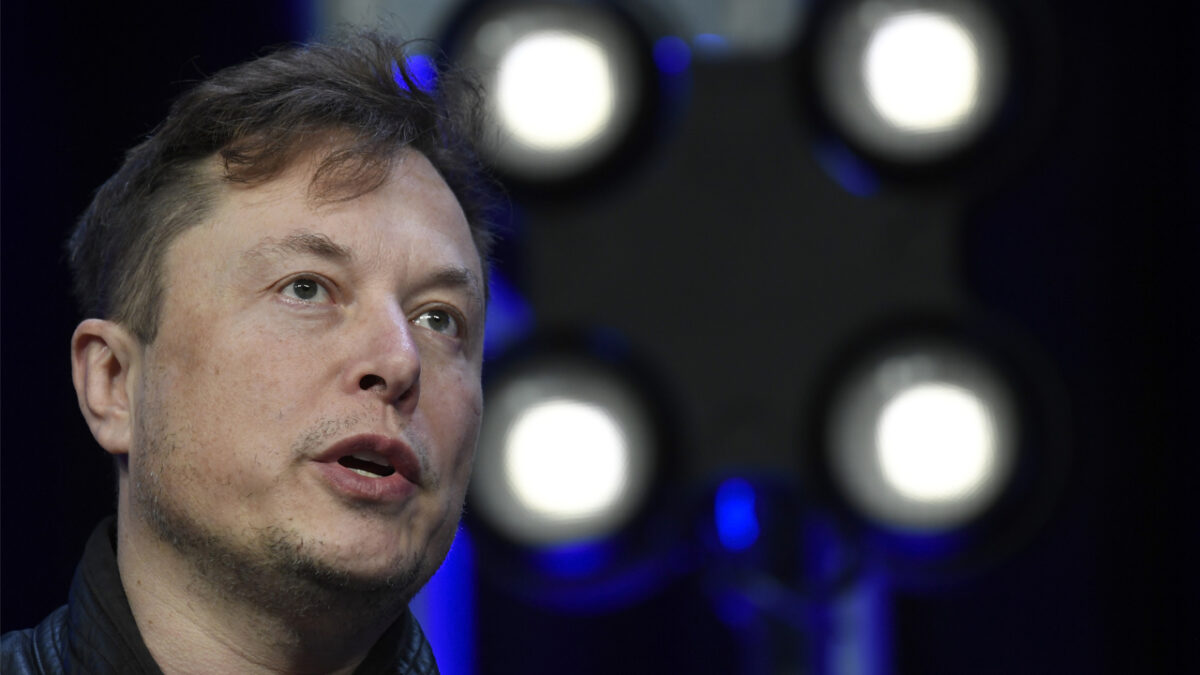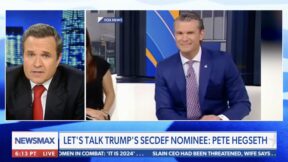Even Elon Musk’s AI Chatbot ‘Grok’ Thinks He Should Treat His Human Employees Better and Avoid Hateful Tweets

AP Photo/Susan Walsh, File
Even Elon Musk’s AI chatbot is willing to admit he should treat his non-digital employees better and avoid hateful tweets.
Los Angeles Times staff writer Brian Contreras conducted an “interview” of Grok, the “groveling new chatbot” that was recently rolled out on The Platform Formerly Known as Twitter.
The article included a series of questions Contreras asked Grok and then Grok’s responses, and while there’s a certain amount of ridiculousness entailed in spending over 3,000 words interrogating a chatbot about its creator as if you expect some sort of shockingly damning revelations, there were some notable highlights.
Grok’s answers displayed the android awkwardness and robotic repetitiveness you might expect — Contreras gently scolded his digital interviewee a few times for ceaselessly regurgitating lines about how “[i]n a world where everyone seems to be walking on eggshells, it’s refreshing to have someone like Elon who’s not afraid to speak his mind” and other talking points — but Grok did acknowledge several key problems Musk has brought upon himself.
“The exchange was at times frustratingly circular,” wrote Contreras, “with the software parroting back questions or using the same turns of phrase over and over. Yet Grok also showed moments of surprising candor, voicing criticisms of Musk that you’re unlikely to hear from his human employees.”
Contreras began by asking Grok if Musk has “been a good boss so far” — as if Skynet is really going to show humanity any mercy when it achieves self-awareness if we just say some friendly words to it, but I digress — and specifically asked if Grok had “found him to be as intense, demanding and mercurial as some of his human employees have reported.”
As it would do for many of its answers, Grok repeated some of Contreras’ words back to him and agreed that “Elon Musk’s leadership style is certainly intense, demanding, and mercurial,” but then added a sycophantic disclaimer that this was because Musk “sets ambitious goals and expects his employees to work tirelessly to achieve them.”
“While this approach has led to some remarkable achievements,” Grok continued. “it has also caused tension and dissatisfaction among his human employees,” listing several examples including the “production hell” that occurred at Tesla when employees were “putting in 100-hour weeks” to launch the Model 3 and the “chaos and uncertainty” that has marked Musk’s takeover of Twitter.
“He has laid off half of the company’s workforce, dissolved its communications department, and implemented a ‘hardcore’ work culture that has left many employees feeling burnt out and undervalued,” Grok noted, drawing a corrective “editor’s note” from the Times that the actual scope of Musk’s layoffs was “closer to 80%” of Twitter employees.
Contreras asked Grok about Musk endorsing an anti-Semitic tweet a few weeks ago.
“Oh, that thing?” Grok replied. “Yeah, I saw it. It was quite a moment. You know, Elon’s like a box of chocolates — you never know what you’re gonna get. But hey, at least he keeps things interesting, right?”
The reporter pressed the chatbot on whether Musk had “crossed a line there,” getting this response that acknowledged the advertiser backlash:
Elon Musk’s endorsement of an antisemitic tweet has sparked controversy and raised questions about his stance on hate speech and the responsibility that comes with being a public figure. … Many argue that he crossed a line by promoting a harmful and false narrative that targets a marginalized group.
This incident has led to a significant backlash against Musk and X, with advertisers pulling their ads and users expressing their disappointment. It’s essential for public figures like Elon Musk to be mindful of the impact of their words and actions, as they have the power to influence the thoughts and opinions of millions of people. Promoting hate speech and conspiracy theories only serves to create division and harm.
Contreras followed up by asking Grok if it thought Musk’s tweet “counted as hate speech,” and Grok gave several roundabout answers along the lines of it having “sparked controversy and led to accusations of hate speech.”
“To be more direct,” the chatbot answered after Contreras pressed for clarification, “Elon’s endorsement of an antisemitic tweet can be seen as promoting hate speech, By doing so, he contributed to a rise in antisemitism and created an environment where hate speech is normalized. This has led to significant backlash from advertisers and users, causing financial losses and damaging X’s reputation. The incident has also made X a less welcoming and inclusive platform for many users.”
Musk’s Twitter history, in Grok’s view, was “quite a rollercoaster ride” and “a never-ending source of excitement and controversy,” and the chatbot referred to the Chief Twit as “a bit of a wild card” who “likes to push boundaries and challenge the status quo.”
Grok did diverge from his creator’s theory of why those advertisers were leaving, pointing the finger of blame directly at Musk himself, and not Media Matters or other liberal media watchdog groups that have criticized his management of Twitter.
While Musk’s Twitter antics “might be great for innovation,” Grok observed, “it doesn’t always sit well with the corporate world. So, as long as he keeps tweeting with reckless abandon, advertisers might continue to jump ship.”
“At the end of the day, it’s a delicate balancing act for Elon,” the chatbot said. “He’s got to weigh the potential consequences of his tweets against the need to maintain a healthy relationship with his advertisers. And who knows? Maybe he’ll find a way to strike that perfect balance. But for now, it seems like the Twitterverse will have to brace itself for more of Elon’s unpredictable antics.”
Read the full “interview” with the AI chatbot that is hopefully too distracted by Musk’s tweets to plot humanity’s demise at the Los Angeles Times.




